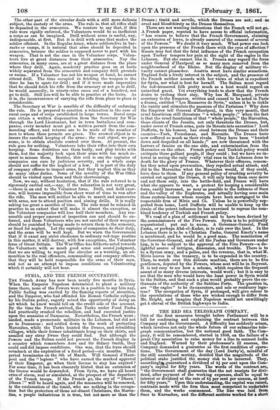THE RED SEA TELEGRAPH COMPANY.
ONE of the first measures brought before Parliament will be a bill for confirming and explaining the contract between this Company and the Government. A difficulty has suddenly arisen, which involves not only the whole future of our submarine tele- graph communication, but the national good faith. The Com- pany, it will be remembered, started in 1858, on the failure of a great City association to raise money for a line to connect India and England. Warned by their predecessor's ill success, the Company demanded a guarantee as the first condition of opera- tions. The Government of the day (Lord Derby's), mindful of the still unsubdued mutiny, decided that the magnitude of the political stake justified the money risk to be incurred. They, accordinglyb guaranteed a dividend of 41 per cent upon the Com- pany's capital for fifty years. The words of the contract are, " the Government shall guarantee that the net receipts for divi- dend, after payment of the working expenses, shall be equal to interest or dividend at the rate of 4-1 per cent per annum, at least for fifty years." Upon this understanding, the capital was raised, contracts made with the firm then most competent to undertake them, and the works commenced. The line was laid from Suez to Kurrachee, and the different sections worked for a short time most efficiently. Messages were transmitted through the whole line from Alexandria to Kurraehee. Unfortunately, this condition of the line lasted only just long enough to complete the engagement by which the contractors, Messrs. Newall and Co., had been bound. Section after section showed " faults," and at last, after five months had been consumed in interminable repairs, only one section remained in full working order. It remains perfect to this day, affording in itself a sufficient proof that the project is not beyond the resources of science. The superintend- ent reported that all were capable of being made good ; and the Company prepared to consider the expediency of further outlay. They had first, however, to settle the claim of their contractors, who demanded 25,0001., kept back " out of certificates," till the cable should have worked thirty days, and 107,0001. jor repairs. The Company resisted, and a commission was sent out to inquire into the circumstances on the spot. Before their return, Messrs. Newell and Co. proposed a compromise, and the dispute was finally settled on payment of 65,0001., or less than half the original claim. The directors, of course, requested the sanction of the Treasury to pay the money, and were directed to act "on their own discretion," but in the course of the discussion the contract was submitted to the law officers of the Crown. They declared that the contract did not bind the Crown to continue payment of .the dividend.
The words which the law officers consider to authorize this con- struction are, "in case the company shall fail in laying down the line, the Lords Commissioners may require the company to give up the line and works, and that the company shall receive a sum equal to the amount of the capital, at the rate of 44 per cent from the day of the last half-yearly payment, to the day on which the transfer shall take place." The law officers hold that this clause does not bind, though it permits, Government to take the line, or —not taking the line, to pay the guaranteed interest. The Treasury, therefore, decline to pay the dividend, but promise to bring in a bill to give effect to the understanding with which the Act was passed, "as," say the Lords, "according to the view held in common by Parliament and all the parties involved, the liability to pay the guaranteed interest was not to be absolutely depending upon the continued working of the line." Indeed, this very question had been raised by the Company, who refused to sign the contract except under a written pledge that " the penalty to be paid by the Company for not completing, or not working, the line should be the enforced surrender of it to the Government," words which constitute an agreement outside of the Act. There can be, of course, no doubt as to the ultimate payment of the dividend. The Treasury, Parliament, the original share- holders, and the present owners, alike believed that the guarantee was permanent and unconditional. The national faith is pledged, if not by the words of the contract, at least by the Parliamentary declarations of those who framed it. But the present decision, while it will injure hundreds by the causeless panic it must create, places one more obstacle in the way of telegraphic communication be- tween India and Great Britain. Surely, the moral claim being frankly admitted, the fairer course would have been to pay the dividend until Parliament could have decided its own liabilities.



























 Previous page
Previous page